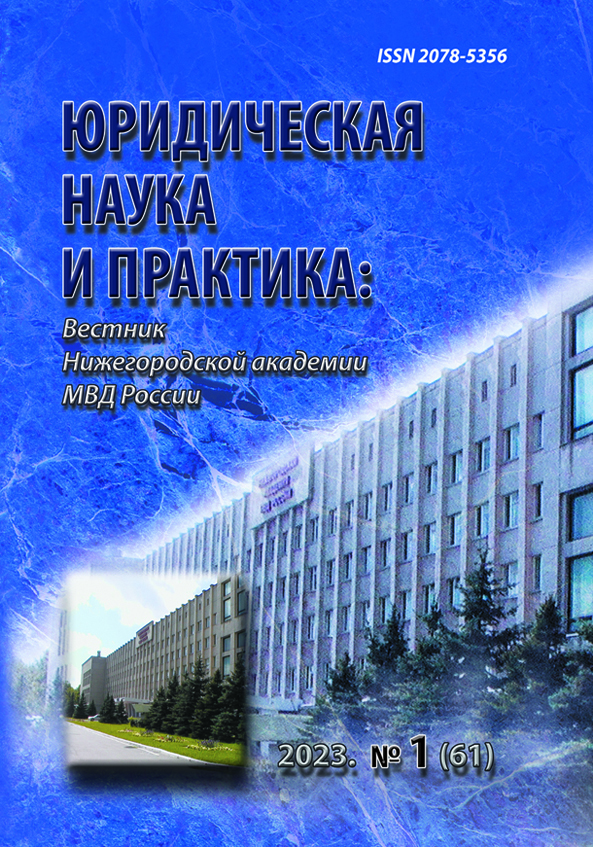The article identifies the potential and assesses the prospect of using the new information technology “Deepfake” based on artificial intelligence and generative-adversarial neural networks in operational investigative activities. A number of problematic issues have been identified that require resolution for the effective use of this technology in solving the tasks of operational investigative activities. Attention is focused on the need to use the “Deepfake” technology in the framework of misinformation of the criminal environment. Synthetic media content in modern conditions is able to provide a solution to operational-investigative tasks of various directions, emphasizing in a special way the prospects of using the “Deepfake” technology in the activities of operational units as a specific method not previously studied in operational-investigative theory and not used in operational-investigative practice. In the conditions of irreversible digitalization of all spheres of public relations, the need for an early transition of the organization and tactics of operational investigative activities into a new phase is indicated, where the role of constantly improving information technologies in operational investigative activities should be a priority.
information technologies, operational investigative activity, artificial intelligence, crime prevention, generative-adversarial neural networks, deepfake, “Deepfake”, deinformation, manipulation
1. A person with a different face: What is a deepfake and why is it dangerous? URL: https://www.5-tv.ru/tabloid/306975/dipfejki-cto-eto-kak-rabotaet-icem-opasno/ (accessed 25.12.2022). (In Russ.)
2. The criminal life of deepfakes. URL: https://zavtra.ru/blogs/kriminal_naya_zhizn_dipfejkov (accessed 25.12.2022). (In Russ.)
3. Greshnova N. A., Sitnik V. N. Ensuring public interest in the context of digitalization: problems of criminal law in Russia (on the example of deepfake technology). Bulletin of the Saratov State Law Academy, 2022, no. 5 (148), pp. 182-189. (In Russ.)
4. Danilova V. A., Levkin D. M. Legal aspects of regulation of “Deepfake” technology in Russia. Law and state: theory and practice, 2022, no. 7 (211), pp. 88-91. (In Russ.)
5. Perina A. S. To the question of the qualification of deepfakes: collection of materials of the international student and scientific conference. Krasnoyarsk: SIBUI of the Ministry of Internal Affairs of Russia Publ., 2022. Issue 24. Pp. 331-333. (In Russ.)
6. Dent S. California cracks down on political and pornographic deepfakes. URL: https://www.engadget.com/2019-10-07-california-deepfake-pornography-politics.html (accessed 22.12.2022). (In Russ.)
7. Ivanov V. G., Ignatovsky Ya. R. Deepfakes: prospects for application in politics and threats to the individual and national security. Bulletin of the Peoples’ Friendship University of Russia. Series: State and municipal management, 2020, no. 4, pp. 379-386. (In Russ.)
8. China introduced criminal penalties for publishing deepfakes without explanation. URL: https://rtvi.com/news/v-kitae-vveli-ugolovnoe-nakazanie-za-publikatsiyu-dipfeykov-bez-poyasneniy/ (accessed 25.12. 2022). (In Russ.)
9. Mikheev E. A., Nestik T. A. Disinformation in social networks: state and prospects of psychological research. Social psychology and society, 2018, vol. 9, no. 2, pp. 5-20. (In Russ.)
10. Dubonosov E. S. Disinformation of the criminal environment in the implementation of operational-investigative activities. News of the Tula State University. Economic and legal sciences, 2021, no. 2, pp. 27-33. (In Russ.)
11. Berdnikov V. L. The subjective side of the crime under article 303 of the Criminal Code of the Russian Federation. Bulletin of the East Siberian Institute of the Ministry of Internal Affairs of Russia, 2022, no. 1 (100), pp. 87-97. (In Russ.)
12. Burmistrova A. A. Lawful operational-search measure “Trap” in the law enforcement practice of the United States of America and the criteria for its delimitation from the provocation of a crime. Siberian Anthropological Journal, 2022, vol. 6, no. 3, pp. 105-110. (In Russ.)
13. Kokurin G. A. On some methods of falsifying the results of operational-search activities. Russian law: education, practice, science, 2022, no. 1, pp. 75-80. (In Russ.)
14. Safonov A. Yu. Methods of committing crimes in criminal cases on the falsification of evidence and (or) the results of the ORD. Altai Legal Bulletin, 2017, no. 4, pp. 122-127. (In Russ.)
15. Sementsov V. A. Provocation of a crime in the operational-search activity. Union of criminologists and criminologists, 2020, no. 4, pp. 45-53. (In Russ.)
16. Sushchenko S. A. The problem of the admissibility of evidence obtained on the basis of operational-search activities as a result of provocation in Russia and foreign countries: some comparative legal aspects. Lukyanov, 2022. No. 3 (92). Pp. 228-234. (In Russ.)
17. Shashin D. G. Operative-investigative measures and provocation: the legality of sanctions and active actions: materials of the All-Russian Scientific and Practical Seminar. Krasnoyarsk, 2022, pp. 34-38. (In Russ.)
18. Shermanov I. S. Falsification of evidence and results of operational-search activities. Scientific statements, 2022, no. 2 (10), pp. 27-29. (In Russ.)
19. Chechetin A. E., Shatokhin I. D., Shmidt A. A. Operational-search activity in the decisions of the Constitutional Court of the Russian Federation: scientific and practical guide. Barnaul, 2022. 136 p. (In Russ.)
20. Elisov P. P. The use of operational disinformation and staging during operational-search activities to identify and document corruption crimes: an analyst’s opinion. Scientific portal of the Ministry of Internal Affairs of Russia, 2015, no. 2 (30), pp. 54-60. (In Russ.)
21. Elisov P. P. The use of operational disinformation and staging in identifying and documenting corruption crimes: a collection of materials from a complex of international scientific and practical conferences. St. Petersburg, Pushkin, 2022, pp. 28-38. (In Russ.)
22. Obraztsov V. A., Andreev S. V., Bertovsky L. V. The use of misinformation in the detection and investigation of crimes. Russian investigator, 2005, no. 8, pp. 2-6. (In Russ.)












